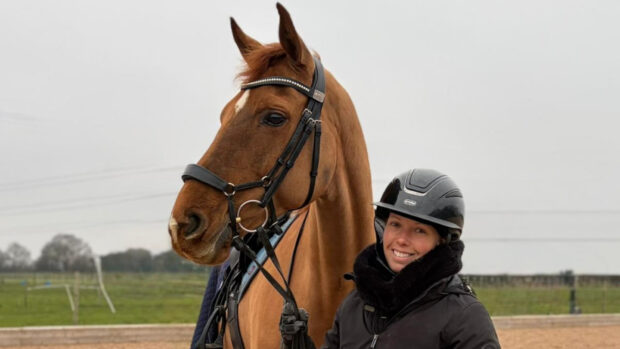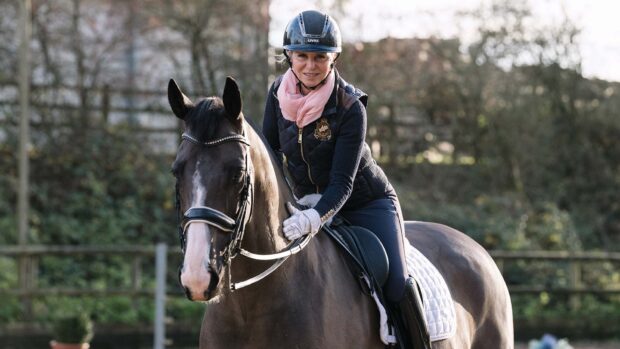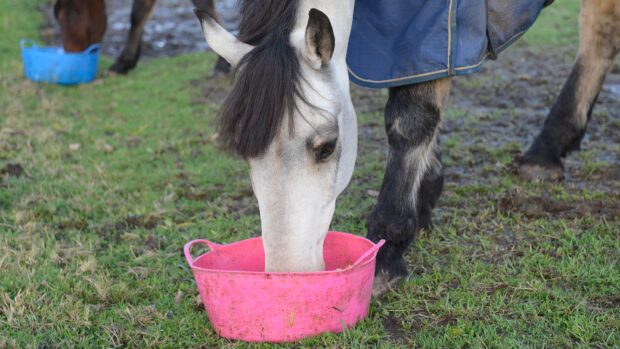As the hot weather continues, some owners may wonder whether they should be feeding their dressage horses differently during the summer.
As most riders compete irrespective of the time of year, energy requirements tend not to increase for the summer season. However, access to grazing and the nutritional value of the grass will alter throughout the year and needs to be taken into consideration when formulating a feeding plan.
Energy levels
The type of work required from a dressage horse could be compared to a cross between weight building and ballet in human terms and requires the development of muscle.
Depending upon a horse’s natural ability and suppleness, dressage does not require huge intakes of energy and excess fat would hinder performance.
At least 50% of the dressage horse’s diet should be forage even when competing at top level. Fibre is accepted as being essential for the maintenance of a healthy gut. It reduces the incidence of stereotypic behaviour, as well as the likelihood of gastric ulcers and colic, helps maintain appetite and is a slow-releasing energy source.
If your horse loses weight easily, most of his additional concentrate feed should be slow-releasing cube or mix which is high in fibre and oil.
If he keeps weight on well, then any additional energy will be converted to extra fat. In this situation, your horse needs a small amount of fast-releasing energy. All starch-based feeds are high in this type of energy — look for one which are formulated to be fed at low levels.
A dressage diet should take into account:
- the work that the horse is doing
- how the horse copes with travelling
- the horse’s condition
- the temperament
- the management
- the quality of the forage
- the current diet
- the weather (are electrolytes needed?)
- the horse’s appetite
The professional rider
Riders competing at Prix St George level and above are familiar with the demands that top-level competitions place both on the horse and the rider at home and abroad. Most top horses are well adapted to travelling and competition stress as it is their normal routine.
These riders tend to increase the amount of salt they feed through the summer, and if the horses are in very hard work, they switch to electrolytes.
When travelling, top competitors don’t feed immediately before leaving, but will provide their horses with nets of hay or haylage for the duration of the journey.
British dressage rider Damian Hallam explains how he adapts his feeding regime during the year: “I compete all year round and all my horses except the two stallions are turned out. Most of my horses are doing at least an hour a day plus travelling to competitions.
“The stallions get extra feed in the spring as they fret off their condition. They are fed D&H Yearling Cubes, some Alfalfa Chaff and glug of oil a day.
“Many of my other horses are four-year-olds, who are in training and competing. I turn them out as much as possible. The spring and summer grazing means I can halve the amount of hard feed I use compared to their winter diet.
“I feed between 2 and 8lbs of D&H Yearling Cubes a day depending upon workload and body condition. They have a double handful of alfalfa chaff and a glug of soya oil, mostly for their coats rather than as energy source.
“I feed yearling cubes as these young horses still have a lot of muscle to build and the cubes are formulated for muscle development rather than fat.
“The young horses who keep weight on easily are on the lower levels of cubes, but to ensure that they are receiving the vitamins and mineral they require, I also give them a feed balancer
“With the recent hot weather, I am very aware of the need for electrolytes so all horses are having a daily dose after work. “
|
What to feed: Dressage horses
There are a number of products that can be incorporated into your dressage horse’s diet but each horse should be treated as an individual, so ask advice from your vet and a nutritionist. Dodson & Horrell products which are suitable for dressage horses include: Staypower Muesli, Staypower Cubes, Performance Concentrate, Country Cubes and Pasture Mix. Dodson & Horrell products currently being fed by Damian Hallam include: Yearling cubes, Surelyte and Ultimate Balancer. For further information and friendly feeding advice call the Dodson & Horrell Feed Helpline (tel: 0870 442 3322) Normal national call rates apply, or visit: www.dodsonandhorrell.com |



